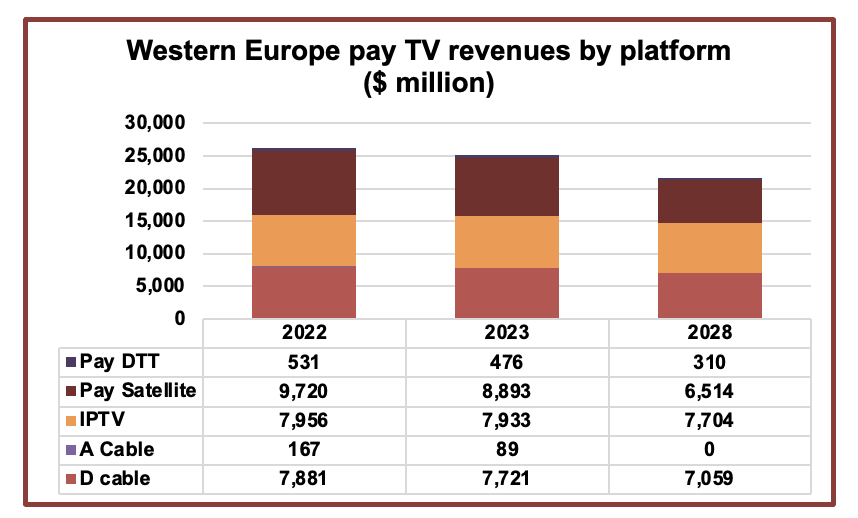Western European VOD revenues are expected to overtake satellite TV in the next two years, according to figures from Digital TV Research.
The research outfit has projected an 18 percent drop in pay-TV revenues over the next five years, losing $5 billion to reach $22 billion in 2027. The decrease is forecast in every country in Western Europe excluding Malta, with the UK and France both losing $1 billion in pay-TV revenues over the five-year period.
Satellite TV is on track to lose $3 billion by 2027, as subscribers convert to IPTV viewing. IPTV revenues have already overtaken cable TV, the research found, and stand to surpass satellite TV in 2025 to become the most lucrative service.
While the shift to internet-delivered TV has been a long time coming, the new figures show that revenues are falling faster than subscriber numbers. Pay-TV subscriptions are set to fall by 7 percent in the next five years while revenues slide by 18 percent, suggesting a faster revenue drop off than previously anticipated.
Simon Murray, principal analyst at Digital TV Research, cites “lower TV ARPUs and less emphasis on TV from the operators” as reasons for the accelerating revenue decline. So while cord-cutting continues across the region, TV operators could feel the effects on their balance sheets before their viewing figures.
The Great British Switch-Off
Last year the firm forecast Sky and Virgin Media, the UK’s biggest pay-TV operators, to shed almost 17 percent of their subscriber base by 2027. Sky’s revenues decreased by 11.5 percent in 2022, as cord-cutting and advertising decline on linear TV started to bite.
Now the company is investing in “internet-ready” products, such as Sky Glass and Sky Stream, which aim to replace satellite dishes and set-top boxes with IPTV services.
And in December, BBC director general Tim Davie announced that the broadcaster is actively preparing for a future where content is exclusively distributed via the internet. “A switch off of broadcast will and should happen over time,” he said, “and we should be active in planning for it.”
But some in the industry are taking a less binary approach, with a hybrid future promising to combine the best of both broadcast and online delivery. Last week, European Broadcasting Union (EBU) tech chief Antonio Arcidiacono argued that combining broadcast and broadband can futureproof TV, particularly for public service broadcasters.






